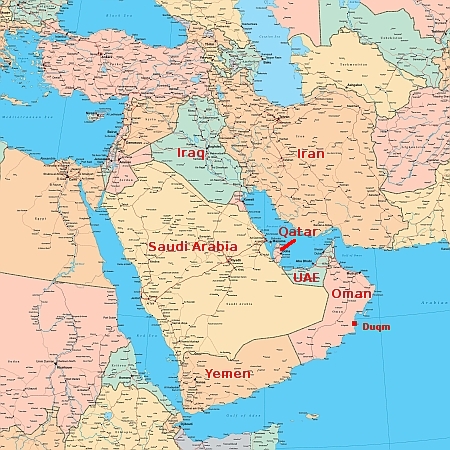Private spaceport proposed on coast of Oman

A private commercial company has proposed building a new spaceport on the coast of Oman near the town of Duqm, as shown on the map to the right.
The commercial spaceport, called Etlaq, is designed to host all sizes of launch vehicles in the port town of Duqm, and would meet US Federal Aviation Administration standards to attract international launch companies.
The National Aerospace Services Company (Nascom), which is overseeing the spaceport, unveiled its plans at the Middle East Space Conference in Muscat, more than a year after initially announcing the project. Nascom chairman Azzan Al Said told The National that the Etlaq Space Launch Complex was in the planning phase and development would start by 2025, with the spaceport set to become fully operational by 2030.
Nascom is apparently Oman’s space agency, and appears tasked to remove barriers to this private project. It is trying to ease the State Department ITAR restrictions that make it impossible for American rocket companies to launch from countries such as Oman. It has also contracted with a UK company that speciallizes in building spaceports.

A private commercial company has proposed building a new spaceport on the coast of Oman near the town of Duqm, as shown on the map to the right.
The commercial spaceport, called Etlaq, is designed to host all sizes of launch vehicles in the port town of Duqm, and would meet US Federal Aviation Administration standards to attract international launch companies.
The National Aerospace Services Company (Nascom), which is overseeing the spaceport, unveiled its plans at the Middle East Space Conference in Muscat, more than a year after initially announcing the project. Nascom chairman Azzan Al Said told The National that the Etlaq Space Launch Complex was in the planning phase and development would start by 2025, with the spaceport set to become fully operational by 2030.
Nascom is apparently Oman’s space agency, and appears tasked to remove barriers to this private project. It is trying to ease the State Department ITAR restrictions that make it impossible for American rocket companies to launch from countries such as Oman. It has also contracted with a UK company that speciallizes in building spaceports.
